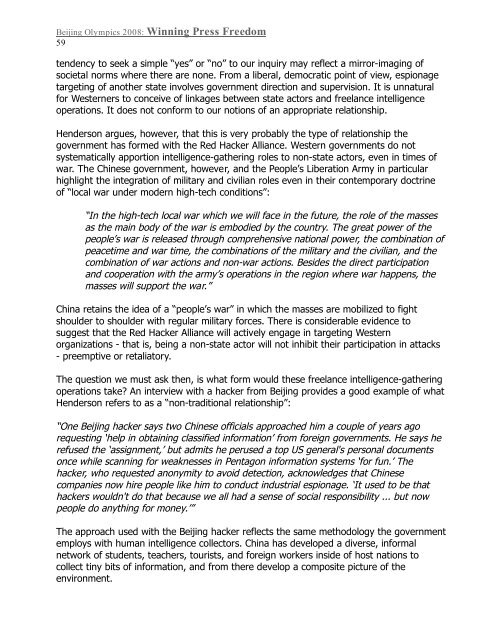Beijing Olympics 2008: Winning Press Freedom - World Press ...
Beijing Olympics 2008: Winning Press Freedom - World Press ...
Beijing Olympics 2008: Winning Press Freedom - World Press ...
Create successful ePaper yourself
Turn your PDF publications into a flip-book with our unique Google optimized e-Paper software.
<strong>Beijing</strong> <strong>Olympics</strong> <strong>2008</strong>: <strong>Winning</strong> <strong>Press</strong> <strong>Freedom</strong><br />
59<br />
tendency to seek a simple “yes” or “no” to our inquiry may reflect a mirror-imaging of<br />
societal norms where there are none. From a liberal, democratic point of view, espionage<br />
targeting of another state involves government direction and supervision. It is unnatural<br />
for Westerners to conceive of linkages between state actors and freelance intelligence<br />
operations. It does not conform to our notions of an appropriate relationship.<br />
Henderson argues, however, that this is very probably the type of relationship the<br />
government has formed with the Red Hacker Alliance. Western governments do not<br />
systematically apportion intelligence-gathering roles to non-state actors, even in times of<br />
war. The Chinese government, however, and the People’s Liberation Army in particular<br />
highlight the integration of military and civilian roles even in their contemporary doctrine<br />
of “local war under modern high-tech conditions”:<br />
“In the high-tech local war which we will face in the future, the role of the masses<br />
as the main body of the war is embodied by the country. The great power of the<br />
people’s war is released through comprehensive national power, the combination of<br />
peacetime and war time, the combinations of the military and the civilian, and the<br />
combination of war actions and non-war actions. Besides the direct participation<br />
and cooperation with the army’s operations in the region where war happens, the<br />
masses will support the war.”<br />
China retains the idea of a “people’s war” in which the masses are mobilized to fight<br />
shoulder to shoulder with regular military forces. There is considerable evidence to<br />
suggest that the Red Hacker Alliance will actively engage in targeting Western<br />
organizations - that is, being a non-state actor will not inhibit their participation in attacks<br />
- preemptive or retaliatory.<br />
The question we must ask then, is what form would these freelance intelligence-gathering<br />
operations take? An interview with a hacker from <strong>Beijing</strong> provides a good example of what<br />
Henderson refers to as a “non-traditional relationship”:<br />
“One <strong>Beijing</strong> hacker says two Chinese officials approached him a couple of years ago<br />
requesting ‘help in obtaining classified information’ from foreign governments. He says he<br />
refused the ‘assignment,’ but admits he perused a top US general's personal documents<br />
once while scanning for weaknesses in Pentagon information systems ‘for fun.’ The<br />
hacker, who requested anonymity to avoid detection, acknowledges that Chinese<br />
companies now hire people like him to conduct industrial espionage. ‘It used to be that<br />
hackers wouldn't do that because we all had a sense of social responsibility ... but now<br />
people do anything for money.’”<br />
The approach used with the <strong>Beijing</strong> hacker reflects the same methodology the government<br />
employs with human intelligence collectors. China has developed a diverse, informal<br />
network of students, teachers, tourists, and foreign workers inside of host nations to<br />
collect tiny bits of information, and from there develop a composite picture of the<br />
environment.





